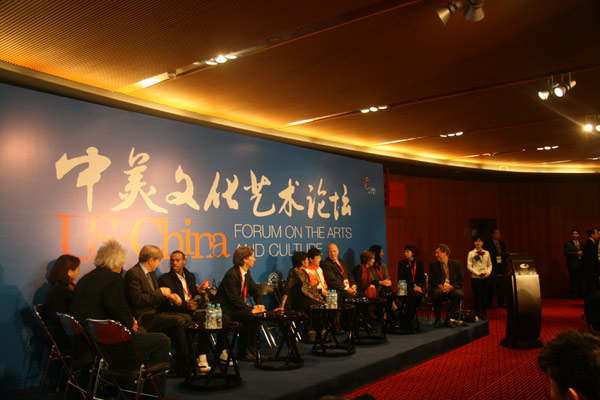US-China exchange sets high goals
- By Wu Jin
 0 Comment(s)
0 Comment(s) Print
Print E-mail
China.org,cn, November 23, 2011
E-mail
China.org,cn, November 23, 2011
Arriving in Beijing to represent the best of America's values, writer Mark Danner expected the cultural exchange more meaningful than the usual songs and stories, but a stage for the two people to "express their souls."
Danner was one of 16 U.S. cultural delegates that included other A-listers like Hollywood star Meryl Streep, sinologist Jonathan Spence and cellist Yo-Yo Ma. The group attended events in Beijing on Nov. 16-19 to promote cultural understanding between China and the U.S.
A writer and journalist known for his investigative reports, Danner said he hardly believed cultural exchange was merely a decoration in bilateral relations. On the contrary, he said it played a significant role in encouraging people to display their individuality.
 |
|
The US cultural delegates, including Eric Fischl (L 1), Charles "Lil Buck" Riley (L 5) and Damian Woetzel (L 6) and , attends a press conference for the opening of the U.S.-China Forum on the Arts and Culture, kicking off on November 17, 2011. [China.org.cn] |
"Cultural traditions play a role not only in arts and music, in pop and fashion, it plays a role in how a country acts on the world stage," he said.
Speaking before a flock of reporters in the National Grand Theater on Nov. 17, Danner relayed an anecdote about recognizing artwork at a distance. He said even before people can get close enough to have a clear view of a painting in a museum or gallery, they can sometimes immediately identify its artist.
"That is because you are in a sense seeing the artist's soul," Danner said. "And the tour (of the American delegation) left an opportunity (for more people) to do so."
Last Thursday's panel discussion was punctuated with film premieres and concerts, and organizers said the event was a start for the two countries to understand each other's cultural traditions and values that are apart from their complicated political and trade relations. U.S. Ambassador Gary Locke, in attendance, called the festivities a "landmark event."
"China and United States are stuck one with another," Danner said. "It's natural that people between the great powers always have commonality of interests and different interests. The trick is to identify the commonality of interests to maximize."
Echoing Danner's emphasis on culture and tradition, historian Jonathan Spence said he would expand his perspective far beyond a current academic approach dominating western societies.
"The old western textbook always starts the history of China with its humiliation in the 19th Century," said the British-born intellectual who specializes in Chinese history. "I'd like to start my teaching about China with the reality of China in the 17th to 18th Century rather than the 19th, and try to see what the triggers were for its remarkable growth."
The four-day cultural exchange was jointly organized by Asia Society's Center on U.S.-China Relations and The Aspen Institute Arts Program, both based in the U.S. The forum is in a partnership with the Chinese People's Association for Friendship with Foreign Countries and the U.S. Embassy in Beijing.






Go to Forum >>0 Comment(s)